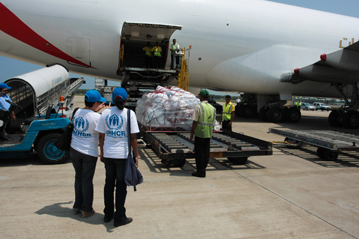Top UNHCR official makes landmark visit to displaced in North Kivu
Top UNHCR official makes landmark visit to displaced in North Kivu

KINSHASA, Democratic Republic of the Congo, June 13 (UNHCR) - Assistant High Commissioner for Operations Judy Cheng-Hopkins on Wednesday became the most senior UNHCR official to visit the hundreds of thousands of displaced people in Democratic Republic of the Congo's North Kivu province.
Cheng-Hopkins talked to internally displaced people (IDPs) about the massive problems they face when she visited three IDP sites in the Beni area. An old woman on crutches said she could not return to her home because of insecurity.
Others told the visitor they needed transport assistance back to their home areas. The displaced also pleaded for help to cover their most basic needs, including food, health services and education for their children. Assistance provided by the central government and donors has largely been inadequate due to fighting and difficult conditions.
Cheng-Hopkins noticed many of the flimsy leaf-covered IDP shelters in the Beni area had been recently destroyed by rainstorms, leaving the displaced exposed to the elements and more vulnerable to disease. In response, UNHCR is to distribute plastic sheeting in the coming days.
The situation in North Kivu province has deteriorated dramatically since late 2006, with widespread human rights abuses carried out by armed groups and direct attacks on civilians. The magnitude of the displacement situation is the worst in three years.
More than 150,000 Congolese have fled their homes in North Kivu since January 2007, bringing the total number of internally displaced in the eastern province to over 600,000. There are an estimated 1 million people displaced throughout the DRC.
The displacement problem in North Kivu was exacerbated when former renegade armed groups were merged with regular armed forces units earlier this year. Previous large-scale movements took place between 2004 and 2006, when people fled fighting in Ituri province between local militias and the government. They still need basic assistance and have received less attention since the new wave of displacement began.
In May this year, UNHCR urged all armed groups to immediately stop practices that violated international human rights and humanitarian law. UNHCR monitoring teams have found that armed groups in North Kivu burned down entire villages, engaged in widespread looting and sexual violence, and massacred unarmed civilians.
UNHCR reports abuses to the government and the UN peace-keeping mission for possible action. UN peace-keepers, acting on UNHCR intervention, have been sent to threatened IDP sites.
Cheng-Hopkins is on a five-day visit to DRC to review support operations for the displaced and to examine the feasibility of refugee returns. She has met senior government officials, including Interior Minister Denis Kalume Numbi, and top UN officials.
She is scheduled to visit IDP sites in Ituri, where there are an estimated 200,000 displaced people. The Assistant High Commissioner is due to leave DRC on Thursday for Uganda, where she will meet senior government officials and visit internal displacement sites.
Last year, the UN refugee agency assumed greater responsibility for protecting and assisting internally displaced populations. It works with other UN agencies in this task.
UNHCR's work in the DRC includes repatriation assistance for 320,000 Congolese refugees living mainly in neighbouring countries. Some 200,000 mainly Angolan, Burundian and Rwandan refugees in the DRC also fall under UNHCR's mandate.
By Jens Hesemann in Kinshasa, Democratic Republic of the Congo









